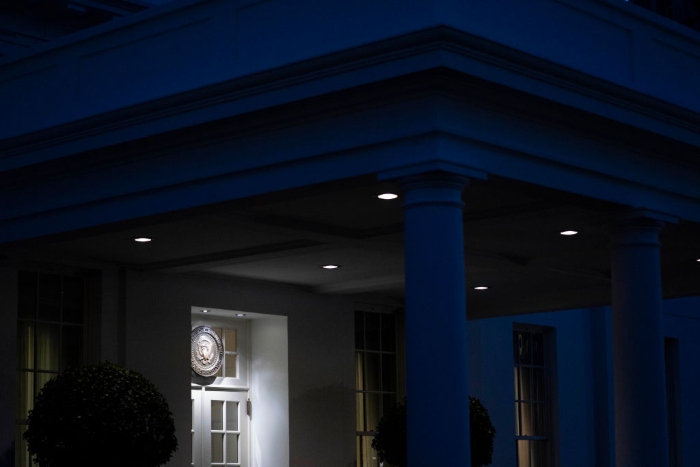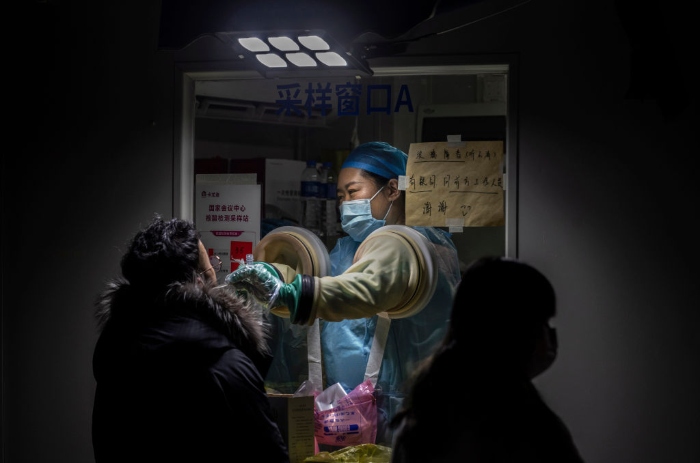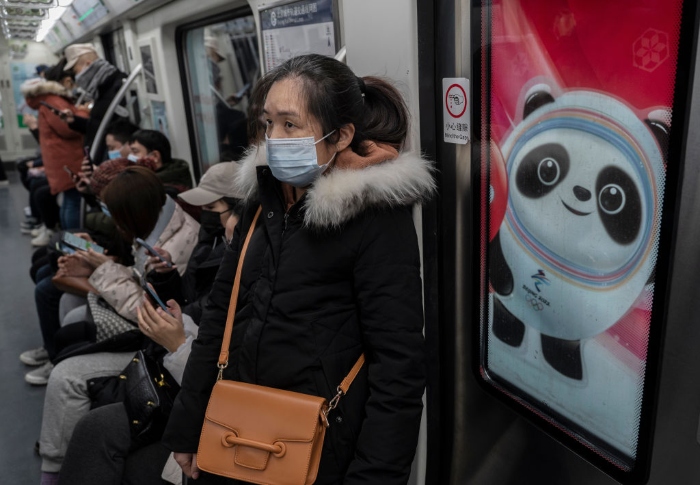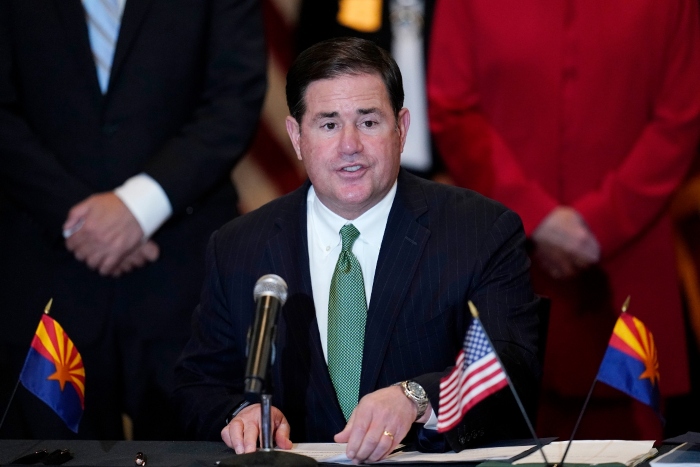| | |  | BY TYLER WEYANT | | 
The West of the White House is seen at sunset. | Sarah Silbiger/Getty Images | A DAY FOR HAPPY HOUR TO START EARLY AT 1600 PENN — Headline after headline today pointed in the same direction: It was one of the worst days of Joe Biden’s presidency. Some lowlights: — SCOTUS blocked Biden’s workplace vaccine rule: The Supreme Court blocked enforcement of the Biden administration’s Covid-19 vaccine-or-test mandate for workers at large businesses but allowed enforcement of a similar mandate for certain health care workers. — The path to a new voting rights law got more perilous: Most of the attention focused on Sens. Joe Manchin (D-W.Va.) and Kyrsten Sinema (D-Ariz.), who oppose changing Senate filibuster rules. But Brian Schatz (D-Hawaii) also said in a statement that he has an asymptomatic case of Covid , temporarily removing a needed vote and underscoring how perilous Democrats’ path is to advancing top priorities on party-line votes in a 50-50 chamber. — And about Sinema: The Arizona Democrat said in a speech that while she ultimately supports the passage of Democrats’ voting rights bills, she “will not support separate actions that worsen the underlying disease of division” by changing Senate rules to pass the legislation with a simple majority vote.
| | | 
A man is given a nucleic acid test for Covid-19 by a health worker at a private testing site in Beijing. | Kevin Frayer/Getty Images | PREGAME JITTERS — Even if you don’t have a good memory for previous editions of this newsletter, you may have heard the Winter Olympic Games start in less than a month on Feb. 4 in Beijing. The headlines out of China have not focused on curling qualifiers or Opening Ceremony performers. More than 20 million people are in lockdown in cities across China after Covid outbreaks. There’s even a woman stuck in a blind date’s home. These latest lockdowns speak as much to China’s “Covid zero” strategy as to its preparations for the Olympics. Nightly chatted over Slack with China Watcher author Phelim Kine about how Chinese officials are responding to the latest outbreak. This conversation has been edited. What do we know about China’s current lockdowns and how they are affecting the country, both in the run-up to the Olympics and beyond? China is implementing its so-called dynamic zero-Covid strategy with a vengeance as it grapples with a worsening series of outbreaks linked to the new Omicron variant that are putting its draconian, but overall effective, Covid control mechanisms to their most serious test since the outbreak — the world’s first — in Wuhan in late 2019-early 2020. There are currently three cities with a combined population of 20 million under complete lockdown. Residents are confined to their homes outside of essential workers. The port city of Tianjin, which is just 80 miles from Beijing, the host of the Winter Games that open on Feb. 4, has an outbreak that resulted in lockdowns of targeted neighborhoods. The ruling Chinese Communist Party's credibility — and that of President Xi Jinping — is on the line because it has explicitly branded China’s zero Covid strategy as a winning formula that has saved lives, preserved the economy and made Beijing a safe host for the Winter Games in the midst of a pandemic. But with Omicron clearly challenging that strategy, both the Chinese govt and Xi Jinping face a critical credibility loss both domestically and internationally. The lockdowns also have profound economic effects because the zero Covid strategy is uncompromising: It shuts down factories, ports, retail areas indiscriminately. And there have been reports of how the lockdown imposed on the central city of Xian late last month caught many residents by surprise, trapping them in their homes without adequate food supplies.
| 
A woman wears a protective mask as she rides on a metro car next to a logo for Beijing 2022 Winter Olympics mascot Bing Dwen Dwen during rush hour in Beijing. | Kevin Frayer/Getty Images | What is the impact on Xi Jingping and his power in the Chinese government? The multiplying outbreaks and their economic and social impact come at an extremely inopportune time for Xi Jinping. He had been counting on using the domestic and international platform of the 2022 Beijing Games to showcase China’s self-declared “victory over the coronavirus” and contrast it with the often stumbling and ineffective pandemic control policies in the U.S. and Europe. And he had the statistics to back that up. China has recorded fewer than 5,000 deaths linked to Covid since it erupted in China in late 2019, while the U.S. is approaching 850,000 deaths. But now there are whispers among Olympic team and IOC officials that the seemingly unstoppable spread of the Omicron variant may result in outbreaks among athletes and/or officials in the Olympic Village and competition areas. Nobody is saying the Olympics might be canceled, but clearly there is high risk that athletes might test positive for Covid and be barred from competition. That certain competitions will be delayed or canceled for those same reasons. It’s possible that along with the daily medal count, media reporting of the Beijing Games will include a daily tally of athletes excluded from competition due to Covid. The second element of the bad timing of these widening outbreaks is its occurring in the run-up to the extremely important Chinese Communist Party’s 20th Party Congress in October, when Xi is widely expected to take the unprecedented step of assuming a third term in office, which will essentially put him on a glide path to ruler-for-life status. Part of Xi’s strength in being able to make that move is his claim to have defeated the coronavirus and protected China from the pandemic while the rest of the world burned. Now it looks quite possible that China is about to enter a period of sustained and likely uncontrollable viral spread that would rob Xi of his claim to having defeated the coronavirus. Can we expect any changes from China in terms of their Covid strategies in the near or long term? Health experts and economists alike say the “dynamic zero Covid strategy” is fundamentally unsustainable. It essentially inflicts a cost that is as bad or worse than the “cure” in terms of economic losses, disrupted supply chains and growing public disaffection. The U.S. and much of the rest of the world, even Australia and New Zealand, which also effectively sealed their borders for the better part of two years with a similar “zero Covid” approach, have recalibrated and reopened, if marginally, on the implicit if not explicit assumption that to a certain extent, countries need to learn to live with the virus with the best mitigation measures possible, but allowing social and economic activities to proceed as near to normal as possible. China can’t do that as readily because it would be an implicit declaration of defeat and failure of their much-hyped strategy and because China’s domestic vaccines are demonstrably inferior to the mRNA formulas produced by Pfizer and Merck but which China has not yet seen fit to provide patents and distribution in China. Which means relaxing the current Covid control settings would inevitably result in massive numbers of infections and deaths among an under-vaccinated population. That would incur great suffering, overwhelm China’s health system, and foster public antipathy toward a gov’t that claimed for two years that it had beaten the virus. So Xi Jinping has an extremely fraught 2022 ahead of him. Welcome to POLITICO Nightly. Reach out with news, tips and ideas at nightly@politico.com. Or contact tonight’s author at tweyant@politico.com, or on Twitter at @tweyant.
| |
| | BECOME A GLOBAL INSIDER: The world is more connected than ever. It has never been more essential to identify, unpack and analyze important news, trends and decisions shaping our future — and we’ve got you covered! Every Monday, Wednesday and Friday, Global Insider author Ryan Heath navigates the global news maze and connects you to power players and events changing our world. Don’t miss out on this influential global community. Subscribe now. | | | | | | | — Head of far-right Oath Keepers, 10 others charged with seditious conspiracy in Capitol riot probe: The Justice Department leveled its most serious charges yet stemming from the Jan. 6 Capitol riot, accusing the national leader of the far-right Oath Keepers militia and 10 others of seditious conspiracy by plotting to use force to block the peaceful transfer of presidential power a year ago. Among those charged for the first time in one new grand jury indictment is Stewart Rhodes, a disbarred attorney alleged to have coordinated the attack on the Capitol, who has long been of significant interest to federal prosecutors probing the insurrection by Donald Trump supporters. Rhodes was arrested in Texas this morning, the Justice Department said. — RNC feud with presidential debate commission escalates with boycott threat: The Republican National Committee has told the Commission on Presidential Debates that it intends to make GOP presidential candidates commit to boycotting its events in the future, escalating an ongoing rift between the two organizations that percolated during the 2020 election cycle. RNC officials sent a letter today to the independent and bipartisan body, which has overseen general election presidential debates for more than three decades, stating the party plans to change its rules and require candidates seeking the Republican nomination to vow not to participate in debates held by the commission. — Senate panel advances Biden’s FDA pick: The Senate HELP Committee voted 13-8 to advance Robert Califf's nomination to head the Food and Drug Administration, putting the Biden administration one step closer to installing a permanent leader at an agency critical to the pandemic response. Two senators who caucus with Democrats — Bernie Sanders (I-Vt.) and Maggie Hassan (D-N.H.) — opposed the nomination. Six Republicans — Bill Cassidy of Louisiana, Mike Braun of Indiana, Roger Marshall of Kansas, Tim Scott of South Carolina, Tommy Tuberville of Alabama and Jerry Moran of Kansas — joined them in opposition. — Top GOP hawks warned Biden against nuclear cuts: The top Republicans on the Senate and House Armed Services committees are warning the Biden administration not to cut any newly approved nuclear weapons as it completes an internal review.
| |
| | STEP INSIDE THE WEST WING: What's really happening in West Wing offices? Find out who's up, who's down, and who really has the president’s ear in our West Wing Playbook newsletter, the insider's guide to the Biden White House and Cabinet. For buzzy nuggets and details that you won't find anywhere else, subscribe today. | | | | | | | A FIRST SENTENCE FOR SYRIAN TORTURE — A German court today sentenced former Syrian colonel Anwar Raslan to life in jail for crimes against humanity, in the world’s first trial about state-led torture by the Assad regime, Louis Westendarp writes. In the landmark case in Koblenz, which began in April 2020, Raslan was convicted of murder, rape, sexual assault and mass torture at a prison in Damascus during Syria’s civil war, which began in 2011. Raslan served in Syrian leader Bashar al-Assad’s security services, and led the intelligence unit that oversaw the running of the jail dubbed “Hell on Earth.” Germany’s universal jurisdiction laws were applied, which allow courts to prosecute crimes against humanity that take place anywhere in the world.
| | | |
| | | | 
Arizona Gov. Doug Ducey | AP Photo/Ross D. Franklin, File | DUCEY R’S WILD CARD? Arizona Gov. Doug Ducey declared in January 2021 that he was “100 percent” focused on his current job and uninterested in a bid for Senate. But speculation among state political insiders that Ducey is plotting a late entry into the Senate race has escalated in recent weeks — a development that would scramble a contest that is pivotal to the battle for the Senate majority, Natalie Allison writes. The term-limited Republican governor, now in his last year of office, has not said anything publicly that suggests he has changed his mind. The Aug. 2 GOP primary to take on Democratic Sen. Mark Kelly is well underway as state Attorney General Mark Brnovich, venture capitalist Blake Masters, solar power executive Jim Lamon and state emergency leader Mick McGuire compete for the nomination, in a race that has already generated millions of dollars in Republican ad spending. Ducey’s final State of the State address on Monday, however, left the Arizona State Capitol Complex abuzz after the governor used the speech to repeatedly criticize the federal government. His address included six mentions of Washington, D.C., along with sustained attacks on Biden and his administration — the kind of broadsides more likely to come from a candidate for federal office than a governor outlining his final state legislative agenda.
| |
|
| | Follow us on Twitter | | | FOLLOW US
|
| |

No comments:
Post a Comment